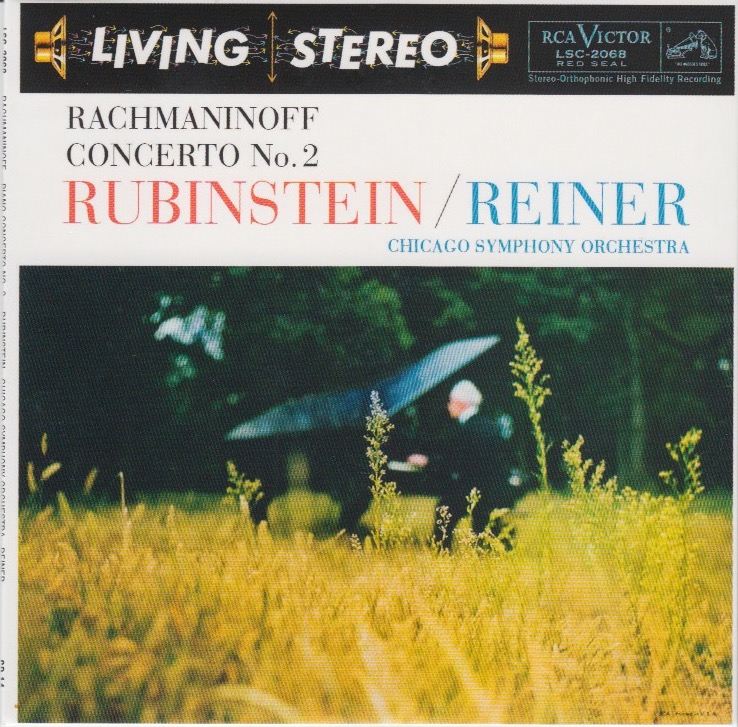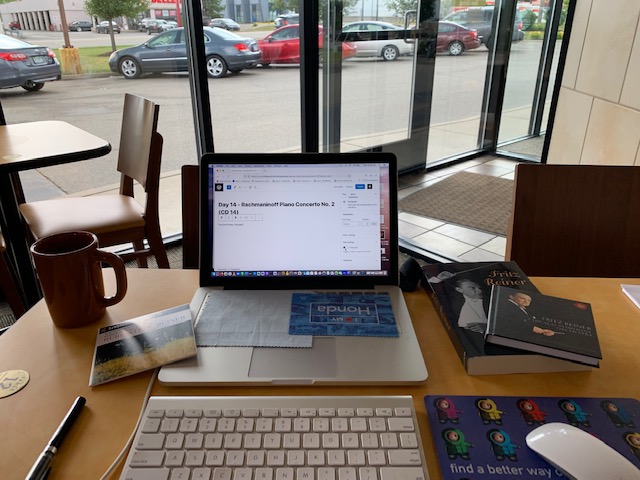
The first thing I thought when I heard the second movement (Adagio Sostenuto) of Rachmaninoff’s Piano Concerto No. 2 was, “Gee, this sounds an awful lot like Eric Carmen‘s 1975 song “All By Myself.”
So I looked up Carmen’s hit song and, sure enough, discovered Carmen lifted the melody from Rachmaninoff’s Piano Concert No. 2 because he assumed the music was in the public domain. He was right – regarding the United States. But not in foreign countries. So now Carmen has to pay 12% royalties to the Rachmaninoff estate for his song “All By Myself.”
And all this time I thought “All By Myself” was an exceptionally poignant song with a heartbreaking melody written by a guy who used to be in a band called Raspberries. I guess it still is that. But the heartbreaking melody came from Sergei Vasilyevich Rachmaninoff (1873-1943) in the years 1900-1901, which makes me want to study Rachmaninoff more closely. I didn’t realize such melodies existed in his music. Are there more of them lurking somewhere in his works?

Because I don’t want to spend four hours today writing about a Reiner album the way I did yesterday, I’m just going to cut to the chase today.
The Objective Stuff
From his entry on Wikipedia,
Sergei Vasilyevich Rachmaninoff (1873-1943) was a Russian composer, virtuoso pianist, and conductor of the late Romantic period. The influence of Tchaikovsky, Rimsky-Korsakov, Balakirev, Mussorgsky, and other Russian composers is seen in his early works, later giving way to a personal style notable for song-like melodicism, expressiveness and rich orchestral colours.
Born into a musical family, Rachmaninoff took up the piano at the age of four. He graduated from the Moscow Conservatory in 1892, having already composed several piano and orchestral pieces. In 1897, following the negative critical reaction to his Symphony No. 1, Rachmaninoff entered a four-year depression and composed little until successful supportive therapy allowed him to complete his enthusiastically received Piano Concerto No. 2 in 1901. In the course of the next sixteen years, Rachmaninoff conducted at the Bolshoi Theatre, relocated to Dresden, Germany, and toured the United States for the first time. Rachmaninoff often featured the piano in his compositions, and he explored the expressive possibilities of the instrument through his own skills as a pianist.
Following the Russian Revolution, Rachmaninoff and his family left Russia. They settled in New York City in 1918. With his main source of income coming from piano and conducting performances, demanding tour schedules led to a reduction in his time for composition. Between 1918 and 1943, he completed just six works, including the Rhapsody on a Theme of Paganini, Symphony No. 3, and Symphonic Dances. By 1942, his failing health led to his relocation to Beverly Hills, California. One month before his death from advanced melanoma, Rachmaninoff was granted American citizenship.
From its entry on Wikipedia,
The Piano Concerto No. 2 in C minor, Op. 18, is a concerto for piano and orchestra composed by Sergei Rachmaninoff between the autumn of 1900 and April 1901. The second and third movements were first performed with the composer as soloist on 2 December 1900. The complete work was premiered, again with the composer as soloist, on 9 November 1901, with his cousin Alexander Siloti conducting.
This piece is one of Rachmaninoff’s most enduringly popular pieces, and established his fame as a concerto composer.
Piano Concert No. 2, Op. 18, was recorded on January 9, 1956, in Orchestra Hall. Fritz Reiner (1888-1963) conducted the Chicago Symphony Orchestra. Rachmaninoff was 27 or 28 when he composed it. Fritz Reiner was 67 or 68.
The Subjective Stuff
Recording quality: 3.5
Overall musicianship: 5
CD booklet notes: 2.5
CD “album cover” information: 4
How does this make me feel: 5
As I’ve mentioned before, whenever a musician of the caliber of Arthur Rubinstein enters the scene, whatever it is gets an immediate boost into the stratosphere. So, Mr. Rubinstein could play Chopsticks or Happy Birthday and it would likely sound elegant.
The only quibble I have with this album is that it seems to lack a bit of the top end. It’s not as crisp as a Living Stereo recording usually is. In fact, it sounds like a mono recording to me – sort of flat, a bit muffled, and not real deep in the spread of instruments. I’ve heard better recordings.
But I’ve rarely heard better performances.
I haven’t heard much Rachmaninoff, even though I’ve heard a lot of Rubinstein. The paring suits both musicians, I think. And it gives me an incentive to explore Rachmaninoff’s complete works.
